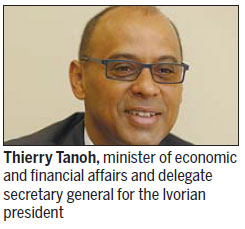Inclusivity at heart of nation's new growth
Cote d'Ivoire's march towards a halcyon period is being driven by policies that aim to share the fruits of success
Africa has long been defined by high infant mortality rates, poor infrastructure and low productivity, but a handful of nations, including Cote d'Ivoire, are starting to emerge from the doldrums.
In Cote d'Ivoire, President Alassane Ouattara's ambitious plan to spur the country to emerging market status by 2020 is bearing fruit.
Besides achieving the sustained high-octane economic output Cote d'Ivoire has posted for the past four years, Ouattara's vision has also attraCoted the billions of dollars in prerequisite foreign investment commitments needed to establish an industrial and transport infrastructure, which will greatly improve the country's ability to further free up the movement of people and goods.
While the country's infant mortality is still high, it is falling nonetheless, World Bank data shows, from 77 deaths per 1,000 live births in 2010, to 67 last year.
"The Ivorian economy should maintain a growth rate of around 8 percent in the coming years," World Bank Country Director for Cote d'Ivoire, Pierre Laporte, prediCoted. He added, however, that "one of the greatest challenges going forward will be to better distribute the benefits of this growth".

Growth and consumption are strong in Cote d'Ivoire thanks to its young and rapidly expanding population. Maintaining this economic vigor will be dependent on ensuring that the country's youth is empowered through adequate access to education and the ability to benefit from financial inclusivity.
"Around two-thirds of our population is aged under 35, giving us extraordinary growth potential," said Thierry Tanoh, the Ivorian minister of economic and financial affairs and delegate secretary-general for the president. "In parallel with investment-boosting policies, we are developing social systems, such as education and healthcare. School is now compulsory for all Ivorians aged 16," Tanoh said.
Political stability is inseparable from the Ivorian boom. International observers now agree that, following last year's smooth election, when President Ouattara won his second term, political risk has greatly decreased in Cote d'Ivoire.
"President Ouattara has created a stable political environment based on strong institutions and an efficient legal system," Tanoh said. "This is important as it gives comfort to national and international investors," he noted.
Cote d'Ivoire socioeconomic improvements have already proven successful in attracting funds from China and beyond.
justin@the-businessreport.com
(China Daily 08/08/2016 page26)














